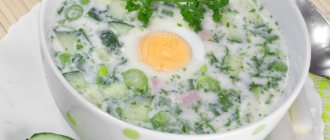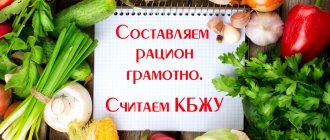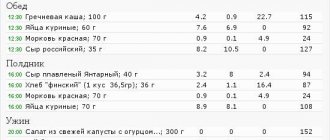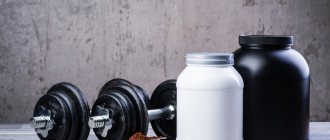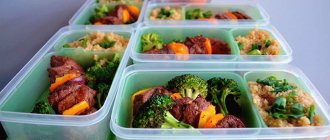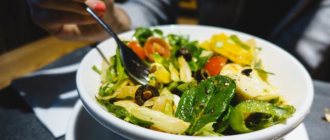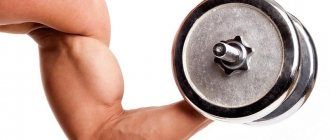In the good old days of bodybuilding, in order to build large amounts of muscle, there was a stage of mass gain, in which not only muscle, unfortunately, was gained, but also fat in large quantities. Then there was a long stage of drying, dietary nutrition of athletes in order to reduce fat deposits. This stage lasts a very long time, since fat disappears as long as it is deposited, but at the same time, muscle volumes still suffer, which also decrease. But using several methods, you can fool your metabolism, you can build muscle and burn fat at the same time. This will be a smarter approach to diet for athletes who want to gain quality muscle mass without spending a lot of time cutting.
Proper nutrition during training
First of all, you don’t need to eliminate glucose from your diet completely. It must be present in a small dose in order to maintain energy for muscle gain. The secret to building muscle and losing fat at the same time is maintaining proper blood sugar levels. When you provide glucose to your body, your body burns it, using it as an energy source for high-intensity workouts. Typically, you get glucose from sugars and starches (carbohydrates) in your diet. The more carbohydrates you consume, the more glucose will be burned during your workout. This reduces the use of proteins (amino acids) from the muscles, preventing catabolism (muscle breakdown). Choose low-fat carbohydrate sources. Of course, exactly how many calories you consume is important
When you reduce your carbohydrate intake, your muscles burn glucose during exercise. This encourages your body to burn more fat, thereby saving any available glucose for those tissues that really need it (like the brain). Your body will use fat for energy. And you should also consume plenty of protein , this is required to meet the needs of the muscles, preventing their wasting.
The problem with following a carbohydrate-restricted diet to lose body fat is that you are susceptible to "muscle depression syndrome." As serious bodybuilders know, when you eat fewer carbohydrates, your muscles lose glycogen and water. This causes them to "deflate" - they become smaller, and muscle growth can come to a halt.
So, if you want to build or even just maintain muscle, you must maintain your glycogen levels. This means you need to eat enough carbohydrates .
Dietary supplements and vitamins for athletes
The body of athletes needs additional sources of nutrients. These include dietary supplements and vitamin-mineral complexes. What are they needed for? Such “helpers” strengthen the immune system, regulate metabolism, replenish the deficiency of essential nutritional components and, of course, “trigger” the processes of burning fat and gaining muscle mass.
Vitamins are fat- and water-soluble. The former are able to accumulate in the human body; their supply does not need to be replenished daily (A, D, E, K). The latter (C, B, folic and pantothenic acids, biotin) cannot accumulate in the body of athletes; their excess is excreted in the urine.
Which vitamins are most beneficial for male athletes:
- B12 (colabamine) – “responsible” for the vital activity of nerve fibers, regulates metabolism;
- Vitamin H (biotin) – participates in the metabolism of amino acids;
- Vitamin A – necessary for normal protein synthesis, ensures glycogen storage;
- B2 (riboflavin) – takes part in energy metabolism;
- E – protects cell membranes from damage, is responsible for cell growth, takes an active part in metabolism;
- B3 (niacin) – ensures high-quality muscle function during training;
- D2, D3 – participate in the process of absorption of phosphorus and calcium;
- B1 (thiamine) – “guarantor” of muscle mass gain;
- B6 (pyridoxine) – takes part in the synthesis of proteins and the process of utilization of carbohydrates;
- C (ascorbic acid) – participates in the formation of collagen, acts as an element of protein synthesis, promotes the absorption of iron, and is involved in the production of steroid hormones (including testosterone);
- Folic acid – takes part in hematopoiesis and amino acid metabolism;
- Vitamins K1, K2, K3 are “responsible” for the process of blood clotting;
- B4 (choline) – is included in the structure of plasma and cell membranes;
- B13 (orotic acid) – stimulates protein metabolism.
Basic nutritional supplements for athletes (make the body more resilient, regulate metabolism):
- PPBC (products of increased biological value) – chocolate, raisins, dried fruits, hematogen. They supply the body with additional energy; it is not recommended to abuse them.
- Proteins are preparations obtained from food raw materials, additionally enriched with amino acids. Whey protein is considered the most common, besides there is isolate and casein (they differ in protein concentration and are taken at different times of the day).
- Amino acids in their pure form: glutamine, leucine, cysteine, methionine, tyrosine, arginine, glutamic acid, ornithine, carnitine, para-aminobenzoic acid. The main task of such substances is to “build” and grow muscles, strengthen the immune system, regulate metabolism, and stimulate the synthesis of hormones.
- Energy drinks (drinks). They contain simple carbohydrates. Indicated for athletes whose sports involve increased endurance (for example, suitable for cyclists).
- Hematogen. This supplement is necessary for the process of hematopoiesis.
- Caffeine. Increases performance, relieves fatigue, provides the body with the necessary amount of energy.
- ACC. Effective immunomodulator.
- Creatine. A guarantee of rapid muscle mass gain.
- Other additives: Vanadyl, Ephedrine preparations, Alpha ketoglutarate, bioflavonoids, etc.
How should athletes take supplements? Most dietary supplements must be taken with food or immediately after it. Proteins are diluted with water or milk. Stimulant drugs are taken in courses (during intense training or before competitions). The maximum duration of one course is 20-30 days.
The nature of nutrition is determined by many factors, the main ones being: age and gender, body weight, health status, training goals and the athlete’s load schedule. In the first stages, it is recommended to seek help from a specialist (trainer or nutrition consultant) - he will help you correctly “build” your individual diet.
Previous Proper nutritionNutrition for gaining lean muscle mass Next Proper nutrition Diet for athletes for every day
Enlarges breasts by 1-2 sizes and shapes posture. Creates ideal curves of the waist and hips. Get 3 sizes slimmer without effort! Buy
Revolutionary technology for losing weight at home. Lose excess weight without dieting or training! In just 23 minutes a day. Buy
Sports nutrition for people who prefer an active and healthy lifestyle. High quality products from famous brands. Buy
Proper nutrition for an athlete
First, determine the number of calories. Eat a minimum of 30 calories per kilogram of body weight.
Amount of carbohydrates: 3-4 g per kilogram of weight. The majority should be consumed from complex carbohydrates. The main sources of carbohydrates in a bodybuilder’s diet are:
- Brown rice, wheat, rice, buckwheat.
- Vegetables - broccoli, asparagus, corn, spinach.
- Fruits (grapefruit, blueberries, oranges, apples).
Consume more protein: 2-3 g per kilogram of weight. Protein sources:
- Chicken breasts, turkey, beef, veal, rabbit.
- Chicken and quail eggs.
- Low-fat dairy products (cottage cheese, yogurt, milk).
- Low-fat fish (tuna, pollock, hake).
Fats should be 1-2 g per kilogram of weight. You get them from animal products, or separately, a tablespoon of flaxseed oil and other unrefined types. Nuts and seeds are also a source of fat. They can be added to breakfast, and the oil can be taken on an empty stomach half an hour before meals.
This way, you'll be consuming no more than 10% of your calories as fat, possibly less. Because of this, you don't need to track your fat intake. If you consistently eat high protein in your diet, all you need to do is adjust your carbohydrate intake, looking in the mirror will tell you whether you need it or not.
As for nutrition before and after training, it is important to calculate the ratio of BJU for your weight, and divide it into 4-5 meals throughout the day. Your task before training is to saturate the body with long-lasting carbohydrates for energy and proteins, the same after training - you must close the protein-carbohydrate window, otherwise the muscles have nothing to increase in volume and they will simply collapse.
Diet for athletes when losing weight
If you are not interested in building muscle during sports activities, but only in losing weight, then you need to plan your menu like this:
- do not consume proteins 5 hours before classes;
- do not eat anything for two hours;
- do not eat as much afterwards;
- protein food 2 hours after training.
The results will not take long to arrive. Don't forget about a special fitness diet. It is good because it allows for large amounts of food and does not cause health problems. The conditions for following this diet are:
- meals five times a day without long breaks;
- drink at least 2 liters of water per day;
- consume low-fat dairy products;
- stew, boil or bake poultry and fish;
- preferred fruits are citrus fruits and green apples;
- It is better to choose brown rice;
- Drink only squeezed juices.
Menu for an athlete for a week
Regardless of whether you have a training day or a day off, an example of a “pre-workout” meal could be a full snack no later than 16.00. The example “after training” is suitable for a late, or last meal.
Monday
- Breakfast: oatmeal with 1 banana, 1 tbsp. l. raisins, 10–20 g walnuts; low-fat milk.
- Snack: whole grain toast with turkey or chicken, low-fat cheese, 1 apple.
- Lunch: chicken breast, baked potatoes, glass of milk, 1 fruit (peach).
- Pre-workout: fruit smoothie (1 cup of fresh fruit and ½ cup of juice), cereal bar.
- After training: protein shake with milk or cottage cheese, bread.
Tuesday
- Breakfast: whole grain wheat porridge with low-fat milk and berries.
- Snack: cottage cheese with honey and walnuts.
- Lunch: beef steak, potatoes, asparagus, low-fat milk.
- Before training: fruits or juices, cottage cheese.
- Post-workout: low-fat yogurt, eggs, bread.
Wednesday
- Breakfast: 2 whole eggs and 3 whites, whole grain bread, tomato, low-fat milk.
- Snack: chicken salad, carrots, cucumber with balsamic vinegar, 1 fruit.
- Lunch: cereals (buckwheat), baked fish, vegetable salad.
- Before training: banana, glass of milk.
- After training: rice, vegetable and seafood salad.
Thursday
- Breakfast: oatmeal with milk, banana and raisins.
- Snack: chicken or turkey meat, vegetable salad, 1 fruit (grapefruit, orange).
- Lunch: rice with steamed fish, pineapple, a glass of low-fat milk.
- Before training: banana, raisins.
- After training: milk, cottage cheese (or protein).
Friday
- Breakfast: wheat cereal with banana and milk.
- Snack: salad with tuna and vegetables, 1 piece of fruit, low-fat yogurt.
- Lunch: buckwheat with chicken, vegetables.
- Before training: whole grain wheat porridge with fruit.
- After training: kefir or fermented baked milk, eggs with vegetables and herbs.
Saturday
- Breakfast: omelet of 2 whole eggs and 3 whites with vegetables, low-fat milk.
- Snack: vegetable and seafood salad, 1 fruit (pineapple).
- Lunch: boiled beef, rice, fresh vegetables.
- Pre-workout: cereal bar, fruit salad.
- After training: fish (hake, pollock) with vegetables, kefir.
Sunday
- Breakfast: oatmeal with dried fruits, nuts, milk.
- Snack: fruit, toast with low-fat cheese.
- Lunch: brown rice with steamed vegetables.
- Pre-workout: small bun with tofu cheese.
- After training: eggs, meat with fresh vegetables, kefir.
Fats
The next component included in the sports nutrition diet is fats. They are also naturally occurring organic compounds. Fats perform two functions - structural and organic, and the rate of their consumption per day is 0.3 -0.7 grams per kilogram of weight.
Fats come in two varieties - saturated and unsaturated, the former of which are made up of molecules filled with hydrogen. In heat they soften, and therefore they are considered harmful because they contribute to the formation of cholesterol build-ups in human blood vessels. Fats slow down metabolic processes, which complicates the process of weight loss. Foods that contain high amounts of saturated fat include coconut oil, margarine, chicken skin, pastry creams, fast food and much more.
The molecules of unsaturated fats are not completely filled with hydrogen, and their sources are products of plant origin. When heated, these fats can turn into a liquid state, so they are quickly processed by the human digestive system. Such fats are not harmful to health.
Other recommendations for organizing a balanced diet
Probably no nutritionist has yet compiled a diet that would suit every athlete. This is due to the fact that each athlete needs a unique nutrition program that is suitable for him, depending on what type of load he is engaged in, what weight category he belongs to and what goals he pursues while playing sports. However, there is a list of general recommendations that are suitable for everyone without exception; they will help you keep yourself in good shape and not harm your own body.
- The food is varied and of high quality. Food products for athletes must be compatible, since the absorption of some of them together is impossible.
- It is necessary to prepare food so that it is healthy. The fat content of the prepared dish depends on this, which should not exceed acceptable standards.
- Fractional meals. You can divide your diet into 6-7 meals, which will allow it to be maximally absorbed and beneficial.
- The last meal should be no more than two hours before bedtime, otherwise fats and carbohydrates will turn into unwanted deposits on the body.
- You should only eat fresh foods that are prepared before eating. Accordingly, it is necessary to exclude fast food and various types of semi-finished products from the diet.
We looked at nutrition for athletes for every day.
